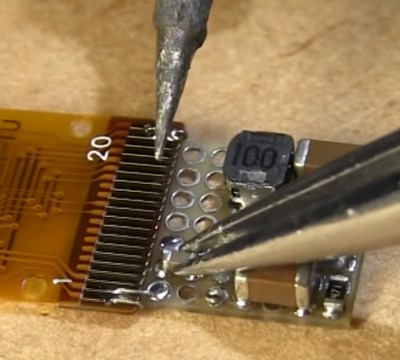Pulling off a flashy project that gets the viral-media hug of widespread approval feels great. Getting there is no easy path to walk and often times the craft that went into a finished project doesn’t even take the back seat but gets no mention at all. Often I find I’m more impressed by — or a least my attention is more strongly captured by — the skills put on display as prominently as the finished build.
 Case-in-point this week comes from the model railroad work of [Diorama111]. Seeing an OLED screen in the nose of an HO scale locomotive just like the real-life version is impressive, but how many people missed the one-off soldering masterpiece that went into this one? You’ll marvel at the SMD techniques used with through-hole protoboard on this one.
Case-in-point this week comes from the model railroad work of [Diorama111]. Seeing an OLED screen in the nose of an HO scale locomotive just like the real-life version is impressive, but how many people missed the one-off soldering masterpiece that went into this one? You’ll marvel at the SMD techniques used with through-hole protoboard on this one.
Occasionally we do get to look over the shoulder of the master as decades of skills are shared for the purpose of passing them on. So was the case back in May when we watched as [Leo] walked through his tips and tricks for prototyping at the electronics bench. This included a lot of non-obvious but clever stuff; tips on working with copper tape for solder buses, using Teflon tubing with bare wire instead of stripping PVC-insulated wire, and a deep dive into copper clad prototyping.
So remember all of us hardware geeks when you look to tell the story of your project. We want to know how it was done at least as much as what was done. There was a time when electronic designers were a separate work group from electronic technicians (and wow, those technicians were in a league of their own). These days we all have that technician hat hanging on our workbenches and I’m always interested in packing in yet another unlearnt skill. Throw us a bone!
















https://old.reddit.com/r/RASPBERRY_PI_PROJECTS/comments/ie0v6m/handmade_hdmi_capture_card/
https://preview.redd.it/mumym19q1ei51.jpg?width=3946&format=pjpg&auto=webp&s=b072c5b5ce6b13acc2574219186317b4f6c5e1fe
That is some crazy fine wire. I wonder where you get that gauge of enamel wire?
Good job calling my attention back to this post for the skills more than the final product. Maybe I don’t need to learn PCB layout after all.
This harkens back to the emphasis Scott Adams places on systems over goals. Once a project (goal) is done, that’s it: there’s only a one-time benefit. But skills (systems) generate continuous returns over time.
When I was in college (UCSB) engineering classes mostly included a weekly 3 hour lab session as well as 2-3 hours in class lecture. Classmates included youngsters like me mixed with former military electronic techs getting engineering degrees. One of the best things was to get one of them in your lab group because with their skill, the lab would always WORK! I learned a lot from them. I took the data and did the writeup. Thank you Jack White, wherever you are!
Ahh… college labs.
When I went to college for my engineering degree I had already spent three years working summers and evenings for a small company that serviced pinball machines and video games.
I remember bringing my own scope and tools to the lab because they were better than what my college had on the bench. I never had any trouble finding a lab partner, “OK we’re going to knock this out in 30 minutes and then you buy the first round – deal?”
I’d had years of hobbyist-level experience by the time I got there, so the deal was “I’ll set this up so we get data and outa here in record time and you (spend a dismal hour or so to ) write it up”. Usually a few rounds were involved as well.
I brought all my own equipment as well. By the time I started college I’d been working as TV/VCR/etc. tech for years, as well as being a hobbyist and ham radio operator. Everyone wanted to be my lab partner…
Funny… the guy I learned the most from during my college years was John White… also a former military fellow. Sadly, with such a common name, he’s impossible to find again.
Leaving this comment late, intentionally.
I was one of those former military. And most of you, at least in the early 1980s, did not like us, and we did not like you. But you still chose to leach off of our knowledge, experience and discipline. Most of my non-mil lab partners were smart enough to shut up and sit down while I banged out the assignment in typically less than 30 minutes. If there was another ex-mil person in the class, we usually found each other.
I was talking to my god son (did several pumps in the sandbox), and he tells the same lab tales. The difference is that now there are students that file formal complaints to the administration when the ex-mils team up in the lab because it is “so unfair”. Some things never change – they only get worse.
Bah, humbug
I learned the hard way that being the note taker while the other person does all the hands on, leaves the note taker without hands on experience.
But on the other hand, sometimes, you get paired with a lab partner who’s English is a far distant second language, and they are only in the lab class because it is a required course.